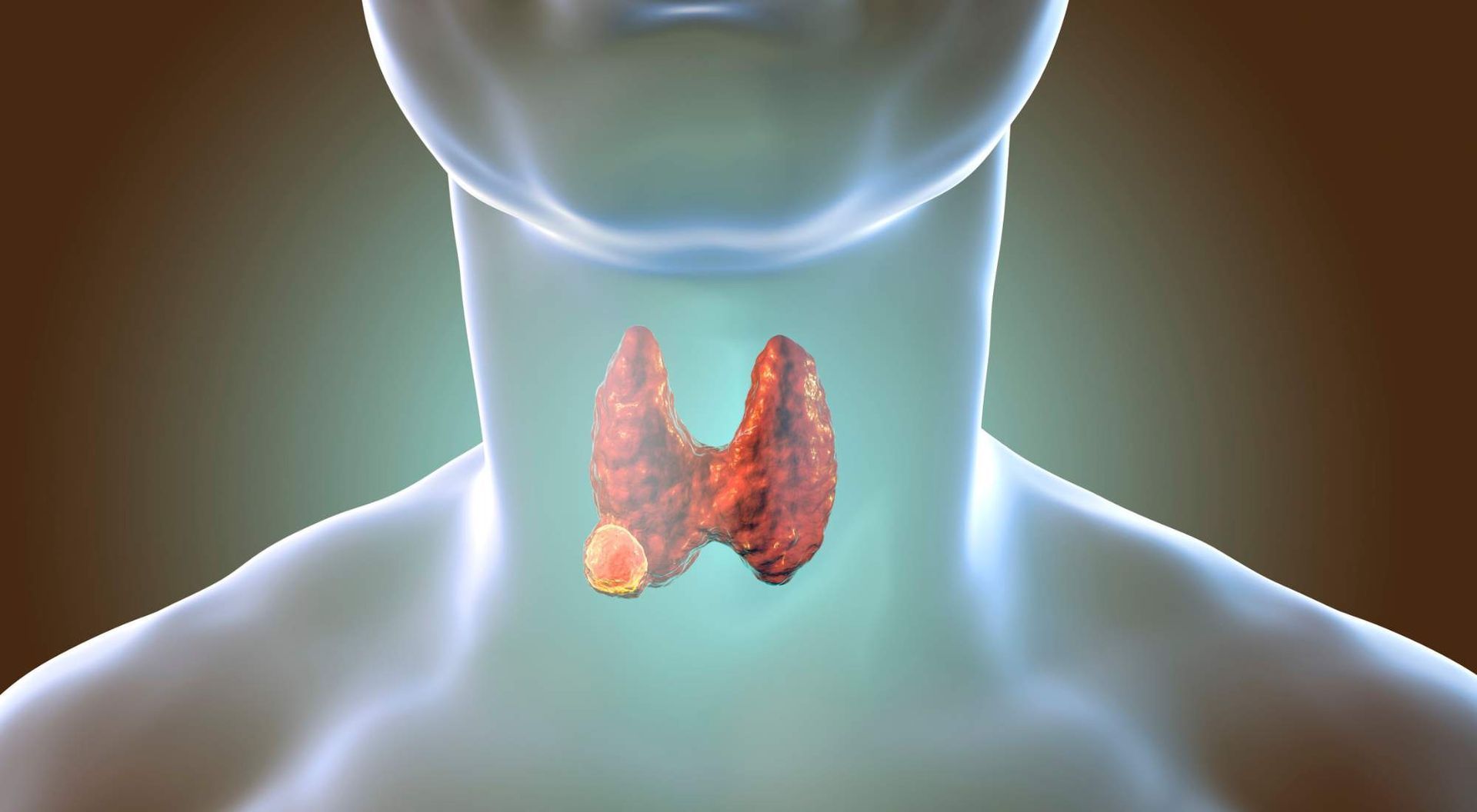Thyroid Issues and Nausea: Causes and Tips To Keep Your Tummy at Ease
"The content below is not intended to be a substitute for professional medical advice, diagnosis, or treatment. Always seek the advice of your physician or other qualified health provider with any questions you may have regarding a medical condition."
Thyroid issues can be incredibly frustrating. It can feel like every symptom you feel is somehow connected to your thyroid, which can make it hard to know how to address the issue.
But here is the good news: managing your thyroid is not as complicated as it seems! With a few key changes in your daily habits, you can start minimizing those symptoms in no time.
In this article, we will dive into how thyroid issues can cause nausea, share practical ways to manage your symptoms, and offer natural, actionable tips to help you feel your best self.
Table of Contents
Can Thyroid Issues Cause Nausea?
Yes! Thyroid issues cause a wide range of symptoms, many of which affect the digestive system. Nausea is just one of the gastrointestinal symptoms that people with thyroid imbalances may experience, but it is often accompanied by other issues like bloating, constipation, or diarrhea.
However, the connection between the thyroid and digestive issues depends largely on whether someone has been diagnosed with hyperthyroidism (overactive thyroid) or hypothyroidism (underactive thyroid).
We will break down how each of these thyroid conditions impacts the stomach and digestive process, exploring how symptoms like nausea arise and what you can do to manage them. By understanding the connection between thyroid imbalances and digestive health, you will be better equipped to address these symptoms and start feeling more at ease.
Understanding Hypothyroidism
Hypothyroidism occurs when the thyroid gland becomes underactive and does not produce enough thyroid hormones, which are vital for regulating many of the body’s key functions. These hormones are crucial for the body’s metabolism, energy production, and even digestive functions.
When the thyroid slows down, it has a cascading effect on various systems in the body, including the digestive system. As a result, people with hypothyroidism may experience a range of symptoms such as:
- Extreme fatigue
- Unexplained weight gain
- Heightened sensitivity to cold
- Dry skin
- Slow or sluggish digestion.
When left untreated, hypothyroidism can have a significant impact on daily life. The good news is that addressing it with medication and lifestyle changes may help restore balance to the body. Over time, these changes may improve the symptoms of hypothyroidism, making digestion more efficient, boosting energy levels, and reducing other uncomfortable symptoms like constipation and nausea.
Understanding Hyperthyroidism
Hyperthyroidism occurs when the thyroid gland becomes overactive and produces too many thyroid hormones. These hormones control the body’s metabolism as well, so an excess may cause the body’s system to speed up.
Common symptoms of hyperthyroidism include:
- Rapid heart rate
- Weight loss despite normal or increased appetite
- Sweating
- Irritability
- Heat intolerance
Treatment for hyperthyroidism typically involves medications, radioiodine therapy, or sometimes surgery, depending on the severity of the condition. These procedures may help normalize hormone levels and alleviate these symptoms.
Both for hypothyroidism and hyperthyroidism, it is important to work closely with a healthcare provider to find the right medication dosage and manage the condition effectively.
Is Nausea a Symptom of Hypothyroidism?
For many with hypothyroidism, it sometimes seems like nearly every symptom they experience can be traced back to their thyroid condition. So, is nausea just another piece of the hypothyroid puzzle? The answer is somewhat complicated.
Nausea is not one of the most common symptoms of hypothyroidism. However, it may still affect some patients, particularly due to related digestive problems, primarily, myogenic disorders of the esophagus, where the esophagus can’t properly contract. These normally lead to disorders of esophageal motility, leading to heartburn or stomach discomfort.
In less common cases, people can experience nausea, vomiting, diarrhea, or abdominal pain as a secondary effect of the slowed metabolism and digestive system.
Why Hypothyroidism May Cause Nausea
Thyroid hormones play an important role in regulating digestion, and when these hormones are low, the process of digestion slows down. This can cause a variety of thyroid-related digestive issues.
In some cases, this sluggishness extends to the esophagus, resulting in esophageal motility disorders. Since the esophagus does not move food efficiently from the mouth to the stomach, it can cause heartburn or reflux, and in some cases, nausea — particularly after eating.
Hypothyroidism may alter gut bacteria and the overall function of the stomach, too. This, in addition to slower digestion, means that food remains in the stomach and intestines longer. The delay in gastric emptying can result in symptoms like bloating, discomfort, fullness, and even nausea.
Is Nausea a Symptom of Hyperthyroidism?
While nausea is more commonly associated with hypothyroidism, it may rarely be a symptom of
hyperthyroidism. Nausea is typically linked to the rapid changes in metabolism and digestion that occur when thyroid hormone levels are too high. The accelerated metabolism leads to faster digestion, which can lead to feelings of discomfort.
Why Hyperthyroidism May Cause Nausea
When thyroid hormone levels are too high, the stomach and intestines begin working faster than usual, which can result in food not being processed properly and other gastrointestinal issues. As the digestive system becomes overly stimulated, it can create a sense of discomfort, fullness, and nausea because the food may not fully break down.
Hyperthyroidism may also cause an increase in stomach acid production, which can contribute to heartburn, reflux, and nausea.
In more severe cases, when hyperthyroidism becomes extremely uncontrolled (such as during a thyroid storm), the rapid acceleration of metabolic processes can overwhelm the body’s systems. In this state, the body’s demand for energy increases drastically, and the digestive system may become overstressed. This can cause nausea, vomiting, diarrhea, and other gastrointestinal symptoms.
5 Tips To Manage Thyroid-Related Nausea Symptoms
Now that we have addressed the question “Can thyroid problems make you feel sick?”, let’s explore effective ways to manage this symptom. Managing these issues often requires a multifaceted approach, especially since thyroid imbalances may affect the digestive system in various ways.
If you are looking for personalized guidance and help managing thyroid issues and related symptoms, HealthierU can help you. Our holistic nutrition programs are tailored to your specific needs and health goals.
While some people manage their thyroid issues with medication, the following tips focus on a more natural, holistic approach to easing nausea and supporting overall digestive health. Let’s explore these simple yet effective options to keep your tummy at ease.
#1: Include Small Meals in a Healthy Diet
One of the best ways to ease nausea is to switch to smaller, more frequent meals throughout the day. Big meals may overwhelm your system, especially when your metabolism is not working as it should.
By eating every three to four hours, you give your stomach a chance to digest food more gradually, keep your blood sugar stable, and consequently, reduce nausea.
Also, focus on
nutrient-rich foods like lean proteins, whole grains, fruits, veggies, and healthy fats. These foods provide essential vitamins and minerals that support thyroid health and fiber that helps your digestive system run smoothly.
#2: Add in Some Ginger
Ginger is a natural remedy that may work wonders when it comes to easing nausea. The compounds in ginger, like gingerol, have natural anti-inflammatory properties that can soothe the stomach and calm nausea. It also helps start digestion and can reduce bloating, which is common with thyroid imbalances.
Whether you prefer it fresh, in a tea, sliced in a cold drink, or as a snack, ginger can be a simple and effective way to ease nausea.
#3: Try Peppermint
The menthol in peppermint has a calming effect on the stomach muscles, helping reduce spasms and ease nausea. It also promotes the flow of bile, which aids digestion, and provides a cooling sensation, which relieves and settles the stomach when you are feeling off.
A warm cup of peppermint tea is one of the simplest and most soothing ways to ease nausea. You can also try using
peppermint oil in a diffuser or a dab on your wrists or temples.
#4: Make Hydration a Priority
Proper hydration helps keep the digestive system moving smoothly, preventing constipation and bloating, which are common issues for people with thyroid imbalances.
When you are dehydrated, your stomach may become more sensitive, leading to increased feelings of nausea. Staying hydrated helps replenish lost fluids, maintain healthy digestion, cultivate a healthy microbiota, and may even soothe an upset stomach.
Aim to drink water throughout the day — small sips can be more effective than gulping down large amounts at once. If plain water does not sit well, try adding a slice of lemon or cucumber for a refreshing twist. Herbal teas may also help with hydration while offering additional soothing benefits for nausea. For an extra boost, consider drinks that contain electrolytes (like coconut water or sports drinks).
#5: Add Supplements
Vitamin B6 has been shown to help alleviate nausea, particularly in cases related to hormonal imbalances. It also plays a vital role in neurotransmitter function and can help reduce symptoms of nausea by supporting the nervous system and improving digestion.
Other supplements like magnesium and iodine may also support thyroid function and help balance hormone levels. However, it is important to consult with a healthcare provider before adding any new supplements to your routine, as each person’s needs are unique.
If you are unsure which supplements are right for you or want guidance on managing thyroid issues naturally, HealthierU can help! Our holistic nutritionist can support you in navigating the process of incorporating supplements and other essential elements into your diet and provide comprehensive
hypothyroidism treatment in Brooklyn.
HealthierU: Natural Thyroid Symptom Relief With a Holistic Nutritional and Lifestyle Approach
Are you ready to take the next step in managing your thyroid-related symptoms and improving your overall health? HealthierU is here to help!
Our team of holistic nutrition experts can provide personalized guidance to help you make positive changes to your diet and habits with a focus on addressing thyroid imbalances and alleviating symptoms like nausea.
Whether you are looking for tailored nutrition advice or a comprehensive approach to better health, we are here to support you every step of the way.
Reach out to us today and schedule an appointment to start your journey toward feeling your best with expert guidance and care.






